Tag : politics
January 26, 2021 by admin
No Ageism Here
My grandmother is a Nana for the Nation. While she was a patient in the hospital just before November’s U.S. election, she spent her time urging everyone to exercise their civic duty. As she got more than a liter of fluid drained from her lungs, 74-year-old Sylvia Fisher wasted no time spreading the word about “why it’s imperative that we vote Trump out of office.”
In addition to this kind of canvassing being totally badass, my Nana also felt she needed to prove her mental acuity in order to get the best care possible, a sad reflection of the state of our current healthcare system. “I had CNN and MSNBC on the whole time so that people would know who they were talking to” she said. She didn’t let a single nurse or attending physician leave without confirming they had a voting plan. She encouraged them to check their registration and vote early. She is rumored to have convinced even a nurse from Florida to vote blue and to call three friends from that swing state urging them to do the same. After being discharged, she took every opportunity to emphasize that the surgeons who saved her life were both immigrants.
—
ABIGAIL FISHER, “A Nana for the Nation,” Lilith Blog, October, 2020.
- No Comments
July 27, 2020 by admin
Elissa Slotkin on Supporting Survivors of Sexual Assault
U.S. Education Secretary Betsy DeVos wants to take back protections for survivors of sexual assault and harassment in schools. Representative Elissa Slotkin (D-MI) fights back:
“These rules fail to live up to what survivors are asking of us as leaders: to keep students safe, and make it easier for survivors to come forward, not harder.”
- No Comments
July 27, 2020 by admin
Politics Shapes Party Dresses
In all the years I’d been wearing, collecting and swooning over vintage fashion, I remained a pure formalist. My appreciation was based on the nuances of cut and color, shape and design. It wasn’t until I began a more methodical kind of research into some of my favorite silhouettes that I began to see how they were part of a broader cultural context. The subject in question was Dior’s “New Look” in women’s clothing, introduced in the spring of 1947, featuring rounded shoulders, a cinched waist and a very full skirt. I was writing a novel, Not Our Kind, set in that year, and my two protagonists—one Jewish, one most emphatically not—were both aware of Dior’s recent game-changer, so I was prompted to find out more about it.
To understand fully the implications of this new and quintessentially “feminine” silhouette, I had to look back just a few years, to World War II, when rationing and privation went hand in hand with patriotism and national pride. The urgent need to direct fabric (and so many other resources) to the war effort had a direct impact on clothing styles. Women’s jackets were fitted and short, and skirts simple and narrow, and both were made with the minimum of material and labor.
So two years later, when the war is over, Dior’s New Look bursts on the fashion scene not like a bombshell—there had been enough of those—but like a meteor shower, dazzling and gorgeous. You can see this even in the jacket—inches longer, trimmed in fur—but it’s the skirt that really drives the point home. That beautiful, long, twirling skirt required 18 yards of fabric, and then another 18 to line it. And then there was its length—a typical skirt of the war years measured 15 inches from the shoe; Dior lengthened his skirt so that measurement was only 9 inches.
Some might see this as gross indulgence, a wanton squandering of resources and time. But this skirt was a powerful symbol of the hopes and dreams of a nation—of several nations—meant to place the horror of the war in the rearview mirror. The elegant, swirling skirt proclaimed the bad times and the deprivation were gone, all past. Now there would be beauty and bounty—vive la différence. And that this dress by Dior photographed by Richard Avedon was shot on the Place de la Concorde may be a coincidence, but it couldn’t be a more perfect expression of the designer’s intent. Peace, harmony, and the embrace of a glorious future were the subtext of a skirt whose graceful, twirling folds evoked a flower unfurling its petals.
Dior’s iconic suit is a good example of how what we wear is an emblem of the times in which we are wearing it, so it’s intriguing to speculate on what kind of effect the present pandemic will have on fashion. In quarantine, women have been jettisoning bras and Spanx in favor of leggings, and loose, unstructured or oversized pieces in soft, skin-caressing fabrics. On fashion sites like Vogue and Harper’s Bazaar there’s been a lot of attention lavished on pajamas—flannel, poplin, silk-trimmed-with-maribou feathers—along with robes, shawls and slippers. The message is clear: we’re staying home in comfort as well as style.
And yet, when the virus is conquered, or at least contained by the triumvirate of testing, treatment and vaccines, women will once more venture out of their homes. What will we be wearing? It might be reasonable to assume that the home-grown comfort will remain with us in spirit and that we’ll be seen trotting around town in caftans or yoga pants and Sketchers.
But I can also envision another scenario, one not unlike Dior’s extravagant response to the austerity of the war years. Our collective post-pandemic aesthetic may well lean toward exuberant color, extravagant pattern and excess of many kinds. Masks are sure to be with us for a time, and we’re already seeing them cast as fashion accessories, rendered in such prints as leopard and toile de Jouy. Gloves—washable, flexible, colorful— may soon follow.
While it’s only a supposition, and not a certainty, I’m casting my vote for the latter trend. Just before Covid-19 exploded, I bought a lime green raw silk coat, circa 1967. Embellished with clear, Lucite buttons and lined with—get ready—hot pink and white polka satin, it’s the perfect garment in which to celebrate victory over the pandemic. Mr. Dior would have agreed.
- No Comments
April 20, 2020 by admin
Big Mouth, Big Ideas
Battling Bella: The Protest Politics of Bella Abzug by Leandra Ruth Zarnow (Harvard University Press, $35) is a comprehensive, sympathetic—but never hagiographic—biography of the first woman to serve as a whip in the U.S. House of Representatives, where she represented New Yorkers from 1971–1977. While the book does not shy away from highlighting Abzug’s harsh treatment of her staff, it also notes her unflinching demand for gender parity in hiring practices of political campaigns.
In addition to noting her contributions to feminist politics and movements, Zarnow also vividly describes Bella’s formidable persona (including her iconic hats and use of the phrase “Abzuglutely.”) We glimpse Abzug’s personal life through her decision to cross gender boundaries and say kaddish for her father—in 1934, when she was still a teenager—and her devastation later in life over her husband’s death.
The book deliberately situates Abzug as “a participant in the American Left,” and frequently refers to her push for social democratic policies both as an activist and as an elected congresswoman. Abzug won office in New York City as part of a wave of New Politics Democrats who were seeking to realign the Democratic Party in a more progressive direction.
The successes and failures of New Politics Democrats have defined the political landscape in the intervening years, and it is impossible when reading this biography not to hear echoes of our current political moment through its pages.
Zarnow makes this most explicit when she notes the Democratic Party’s introduction of “unelected superdelegates with voting powers in 1984 to keep insolent challenges… in check.” In effect, these unelected superdelegates were meant to curtail the more radical candidates and policies the New Politics coalition might bring up for a vote on the convention floor (e.g. their passage of a platform plank in 1980 which called for Medicaid funding of abortion). As the author mentions, the role of unelected superdelegates again caused controversy amongst a new crop of reformers in the 2016 election and was only partially reformed as a result in 2018. As the 2020 Democratic Party convention approaches, the structural impediment used to stop Abzug and others from pushing feminist politics still partially remains in place.
While it can be ahistorical to draw oo many one-to-one parallels from the past to the present, I think it is worth highlighting a few further similarities. The cadre of New Politics Democrats who were elected to Congress in the late 60s and early 70s is evocative of the “Squad” of insurgent Democratic congresswomen who won office in 2018, as is the sense of crisis motivating them. New Politics Democrats urgently sought to end the Vietnam War and avoid nuclear Armageddon with a similar fervor to how current organizers are seeking to stave off a coming climate apocalypse. The campaign calling for Alexandria Ocasio-Cortez (NY–14) to have a committee seat on Ways and Means mirrors both Abzug’s campaign to be on the Armed Services Committee in 1971 and Congresswoman Shirley Chisholm’s campaign to change her appointment away from the Agriculture Committee in 1969. Likewise, many of the same smears thrown at Abzug are similar to attacks currently leveled by the right. Particularly startling to me were the eerie parallels to the way in which attacks questioning the legitimacy of Abzug’s Jewishness parallel the smears leveled against many millennial leftwing Jewish activists, despite the divergent positions on Zionism between Abzug and many of the activists of my generation who are similarly attacked.
The 1960s and 1970s are not the 2010s and 2020s, and Zarnow effectively relays the climate and various political currents to her readership. The author advocates for re-evaluating the 1970s “not as an era of limits but as an imaginative, expansive” period. While there may be elements to this appeal worth considering, it is nevertheless inescapable that the ultimate inability of the New Politics Democrats to win a governing majority in the 1970s led away from social democracy to the consolidation of power in a neoliberal order. After losing her Senate bid in 1976, Abzug would never again return to elected office, though she had served as a Congresswoman for three terms.
The question facing those of us who share a similar vision of the world is whether our movement can avoid the same end. While Battling Bella does not provide clear answers to this question, it does provide a thorough depiction of one of the most iconic figures of the New Politics Democrats. By studying the past upon which our present is built, we can hopefully steer the course to a better future.
Amelia Dornbush works for a union in Michigan. She has previously written for Lilith and Democratic Left.
- No Comments
January 16, 2020 by admin
Speaking Truth to Trump
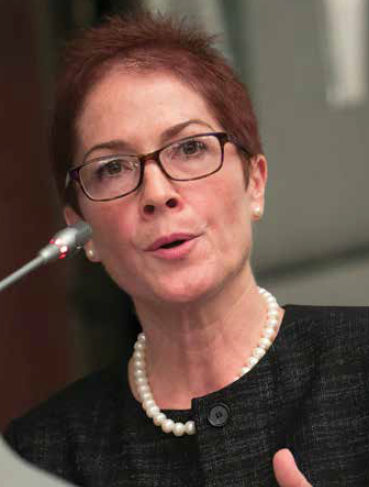
Frequently, it is women who have come forward, in droves, to speak truth to [Trump’s] power, or to nonsense, or, perhaps most accurately, to the nonsense that feeds his power.
From Sally Yates to E. Jean Carroll to April Ryan to Greta Thunberg to Fiona Hill to the undocumented housekeepers who used to work at his properties, it is often women who have stood up to say “No” to this president. As Sandra Diaz, one of those two undocumented cleaners, explained her decision to finally speak up even though everyone around her warned her not to: “How can you know something so big, how someone — who goes on national television and says something — and you know it’s not true … whether it’s the president or not, you have the responsibility to say no. To pass through this barrier of fear and say no.” Ukraine Ambassador Marie Yovanovitch [below] described, in real time, at a public Intelligence Committee hearing last month, what it feels like to pass through that same barrier of fear: As Trump tweeted threats at her midhearing, she was asked how she was experiencing it. “It’s very intimidating,” Yovanovitch quietly confessed to the members of the Intelligence Committee. “I can’t speak to what the president is trying to do, but I think the effect is to be intimidating.”
DAHLIA LITHWICK “The Women Who Still Speak Up,” Slate, December 6, 2019.
- No Comments
January 16, 2020 by admin
Making America Smart Again
I LIVE PART-TIME IN RURAL MICHIGAN. While helping me pull weeds in the summer before the 2016 presidential election, a friend of mine, a non-college- educated white woman, told me that the increase in her health insurance premium under the Affordable Care Act would make her more likely to vote for the Republican candidate. (This was before Donald Trump was nominated. I have not asked her how she voted.) Her health insurance premium had been significantly less under the old system when she could purchase an individual plan with a high but manageable deductible. According to her, no similar plan was offered in Michigan after the passage of the Affordable Care Act.
There was no mistaking her sense of hurt. She talked about how much she was suffering, even though she worked hard and was a responsible employer and employee. She shared how unfair she thought it was that, even with these qualities, she was still suffering.
Several months later, I talked with my friend’s aunt, also not college-educated, about the job situation in our area of rural Michigan. “There are no jobs here,” she told me, as we discussed the fact that there once were many more in manufacturing, for instance at nearby Whirlpool, which has moved much of its manufacturing abroad.
These two smart women identified two policy arenas of life-saving importance to every woman: health care and jobs. I don’t know how they voted in 2016, but I do know this: they want the same economic security that I, a college-educated woman, do.
No woman needs a formal education to understand the advantages of being a self-interested voter, but every woman deserves as compelling a case as possible for her consideration.
In the Chicago Tribune, Renee Elliott, who lost her job at the Indianapolis Carrier factory that Donald Trump promised to save, wrote:
Last month, despite Trump’s promise, Carrier laid off another 215 employees and shifted their work to Mexico. I lost my job. As a result, I’m losing my health insurance, my retirement benefits and quite possibly my home…. I feel betrayed, angry and forgotten— and I’m not alone…. Even though working people like me helped put Trump in the White House, the truth is that he’s done nothing to keep his promises to save American jobs.
The action I propose here is to make America think again, which starts with finding ways to educate voters about why it is important to vote in their self-interest.
The remedy here is educating every voter about the importance to her own life of supporting candidates who propose economic policies that advance economic security for every woman, even when other policy proposals may be distasteful.
Rebecca Sive, who has taught politics at the University of Chicago and founded one of the nation’s first women’s centers, is an advocate for women’s political power and public leadership.
From Vote Her In by Rebecca Sive, copyright 2020, Midway Press.
- No Comments
July 15, 2019 by Eleanor J. Bader
Belladonna Founder Rachel Levitsky on Poetry, Politics, and What Comes Next
Rachel Levitsky calls herself a “lesbian, commie, poet, and polemicist who makes things.” And she does: Levitsky has written three full-length books and nine chapbooks herself, teaches undergraduates, and is the founder of the Belladonna Collaborative, a 20-year-old feminist avant-garde literary salon and publisher of experimental, multi-gendered, and linguistically bold titles.
Among Belladonna’s releases are award-winning texts from writers including LaTasha N. Nevada Diggs (Whiting Award) and Beth Murray, whose posthumous book of poems, Cancer Angel, won the 2016 California Book Award. Levitsky sat down with Eleanor J. Bader in Belladonna’s office.
Eleanor J. Bader: Have you always been a poet?
Rachel Levitsky: When I was a child my dad told me not to be a poet. Writing poetry was not an occupation in the Levitsky consciousness. I did not come out as a poet until 1994.
 EJB: Do you know why your father had this attitude?
EJB: Do you know why your father had this attitude?
RL: My parents seemed to value invisibility. My mother had been born in Germany and came to the US as a toddler in December 1939. Her uncle survived Auschwitz, but no one in my family was willing to talk about any of this and I always wanted to know more.
EJB: Is this why you became interested in history?
RL: Maybe. I was a history major as an undergraduate at the State University of New York (SUNY) in Albany and got a Master’s in American Social History. My focus was labor. My thesis looked at the way the cigar industry in Binghamton, NY became segregated by gender.
EJB: But you chose to pursue activism.
RL: I wasn’t interested in pursuing further academic study in History. I plunged into activism in New York City, joining ACT-UP and WHAM!—Women’s Health Action and Mobilization.
My job at the time was with the Home Program of the Bond Street Homeless Center run by Catholic Charities. Every night, five of us would load into a van and drive around Brooklyn trying to convince mentally-ill, chemically-addicted people to come to the Center’s drop-in program.
I did this work in 1991 and 1992, until I got a job teaching adult basic education classes for the Consortium of Worker Education (CWE), an educational organization that serves union members. In 1993-94 I taught English in Mexico. When I came back to the US, I returned to the CWE and eventually got a full-time job running an English as a Second Language program at the Painters and Finishers Apprenticeship program in Long Island City.
- No Comments
April 2, 2019 by admin
Women Shake Things Up in a Major Statehouse
For decades, women in New York facing heartbreaking medical issues in the later months of pregnancy had to fly to other states for terminations, thanks to outdated abortion laws. This January, after years of lobbying, activism and voting, that finally changed.
In the November 2018 elections, New York’s legislature saw a very similar outcome to the national results: progressive women storming the gates of the state capital in Albany. Since that change of power, New York State is already a model for passing certain kinds of legislation with particular importance to women. The women legislators—veteran and newbie alike—wasted no time focusing on issues like abortion and maternal mortality.
In particular, shortly after the first 2019 legislative session opened, a landmark Reproductive Health Act was passed, codifying Roe in the state law, after years of being stalled by a Republican state senate. Ditto for a long-awaited Child Victims’ Act, which had long been kept from moving forward thanks to a toxic combination of Catholic church and ultra-Orthodox lawmakers whose communities did not want allegations of long-ago child sexual abuse in their schools and houses of worship to surface.
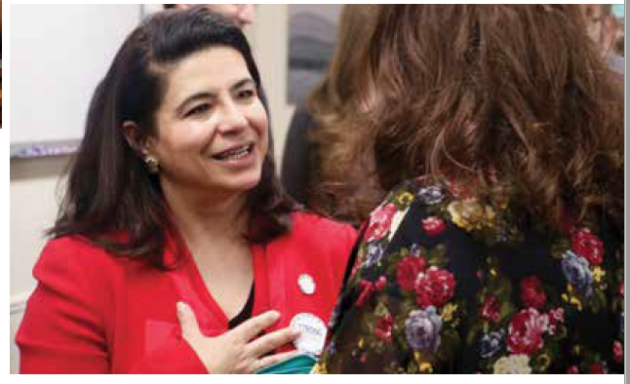
Anna Kaplan. Photo by Joan Roth
Several Jewish women were newly elected to this state legislature in the 2018 midterm, joining prominent Jewish female state legislators with years of experience. Their presence, plus the Democratic-majority senate, had major influence in passing these bills and others that followed.
If Roe fails to survive the conservative U.S. Supreme Court, New York’s strong support for abortion rights and reproductive justice will make the state a beacon in a dark, misogynistic universe—which helps explain the backlash that the Reproductive Health Act has received from conservatives who have lied and cried “infanticide.” The reality is different. Now, later abortions—recommended only in dire medical circumstances for mother or fetus—will be available in New York State, allowing women to receive that heartbreaking, personal care at home instead of enduring out-of-state travel.
“Today we turn the page,” said Senator Liz Krueger when the bill passed. Krueger has represented New York City’s Upper East Side since 2002, and has been lining up the ducks for this moment for 10 years in Albany.
Krueger is a powerhouse, chairing the Senate finance committee, among other roles, and a new position of influence in the fight to legalize cannabis in the state; her involvement in that issue, she told Lilith, was spurred by her longstanding concern about unjust incarcerations.

Julia Salazar. Photo by Joan Roth.
“Every issue is a women’s issue,” she said. “So it’s better to have more women at the table. Income issues have a disproportionate effect on women at both ends of the age spectrum—from young single mothers to older widows living on one income.”
Krueger’s tireless work was applauded by a large crowd at a Town Hall rally in Manhattan in February. One of the enthusiastic participants and sign-holders announced that “Liz Krueger is a rock star!”
As is the tradition, Krueger told Lilith in an interview in her Manhattan district office, a new senator is given a promising bill to sponsor, so that she or he will have an early success. In keeping with this tradition, Krueger says she invited newly elected senator Julia Salazar to sponsor a sister bill to the Reproductive Health Act—the Contraceptive Coverage Act, which makes it mandatory for insurance to cover birth control.
Salazar herself was making waves before she won November’s primary as a young, self-identified socialist candidate who upset longtime incumbent Martin Dilan. She won a convincing victory in gentrifying North Brooklyn, despite an onslaught of negative publicity that included serious questions raised about how accurately she has represented herself and her family and religious background (she identifies as Jewish and Colombian). The fracas was so confusing it required an “explainer” on the website Vox. But Salazar’s resounding victory—and focus on issues from abortion to local, thorny tenant-landlord conflicts, to decriminalizing sex work—has meant that the debate swirling around her these days is back in the policy realm. And she’s staying true to her roots, rhetorically speaking: “Don’t forget that International Women’s Day was started by anti-capitalist socialist feminist organizers,” she reminded supporters on Instagram in March.
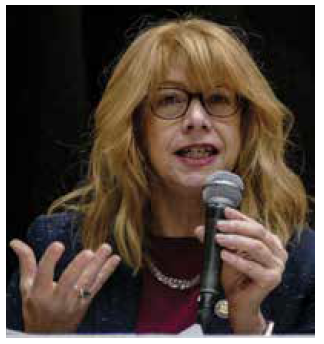
Linda Rosenthal. Photo by Joan Roth.
Also standing with Krueger and defending the R.H.A. is Senator Anna Kaplan (n.e Anna Monahemi) a Persian-Jewish-American politician from Great Neck, New York. “It was vital that abortion be taken out of penal code and put into health code because that’s what it is—healthcare,” she told Lilith. Now the New York State Senator for the 7th district, on Long Island, Kaplan was born in Tabriz, Iran. When the Islamic Revolution swept that country, her parents sent her to the United States for safety. Fostered first by a family in Brooklyn and then in Los Angeles, she eventually settled in Great Neck, a Long Island community with a large Persian Jewish population.
But though her electoral victory was solid, Kaplan told Lilith, her home community didn’t rally around her. The reason, some women in the community told Lilith, was that “she is both a Democrat and a woman.”
“That hurt a lot,” said Kaplan. “That my own community gave so little support.” Nonetheless, she swept to victory in November, and is focusing on education—which is core to her values as a Jew and an immigrant. “To me, in this country, public schools level the playing field,” she told Lilith. “I am a product of a public school, and so are my children.”
Along with Krueger, Assemblymember Linda Rosenthal, who represents NYC’s Upper West Side, is a strong progressive figure in New York politics. A fixture at city protests and events for years, she is poised to take action on issues big and small—recently working on everything from rent control to animal welfare to raising the statewide smoking and vaping age to 21. She’s been passionate about fair elections as well as menstrual equality—even hosting a tampon-a-thon at her office to collect sanitary supplies for local shelters.
For many years now, conservative men have dominated state legislatures around the country—which explains in part why so many bills that chisel away at Roe, state by state, restriction by restriction, have been passed since 2011. The importance of having strong women at the state level can’t be overstated—from issues like gun violence and abortion to fairer taxation, transit, childcare and housing and, of course, tampons. The women of the New York State legislature are targeting the maternal mortality crisis next.
Women’s lives can be directly and immediately improved when other women are in the halls of power. “It’s nice to come to the office in majority because you can actually get things done,” Kaplan told Lilith.
Joan Roth is Lilith’s staff photographer. Shira Gorelick is a freelance writer and photographer.
- No Comments
January 10, 2019 by admin
After the Concession Speech
While the media spotlight has, deservedly, focused on the winners of November’s mid-term elections, it would be ecologically foolhardy to turn all our attention away from the Jewish women who were defeated. Their races elicited new political donations, attracted legions of first-time volunteer canvassers and ratcheted up political awareness in their communities. Plus, this rising of the women brought into public consciousness an array of social issues often dormant in male-only races: reproductive justice, literacy, gun control, student debt, food insecurity, lgbt rights, disability activism, and more.
These are concerns that need to stay on the front burner (note domestic images when we speak of women!) so that candidates who did win seats in Congress will enact urgently needed legislation.
What are the ex-candidates planning, now that the balloons have been deflated, the microphones silenced and the spotlights switched off?
They are calling it the “women’s wave.” In 2018, perhaps spurred by misogyny in the 2016 U.S. presidential campaign, perhaps simply because it was time, a recordbreaking number of women ran for election— for governorships, the House of Representatives and the Senate.
All year long, photographer Joan Roth has been on the road with these inspiring candidates, snapping pictures as they shook hands, chatted with constituents, and stood at the podium for rallies and fundraisers.
But the noise couldn’t answer the question of whether all these candidates would actually storm the traditionally male halls of power in Washington. Tensions were high before the hotly contested midterm elections in November. Would the polls be wrong again, as they were two years ago? This time, though, the wave turned out to be real, as predicted, both blue—bringing Democratic control to the House— and female. In fact, this January, the U.S. House of Representatives seats an unprecedented number of women, at least 90.
In addition to quite a few new wins for Jewish women in much-watched contests—including rising stars like Representative-Elect Elissa Slotkin of Michigan, Senator-Elect Jacky Rosen of Nevada and local race winners Alma Hernandez (in Tucson) and Julia Salazar (Brooklyn), the election night saw major firsts. Democrats Deb Haaland and Sharice Davids became the first Native American women elected to the House, while Democrats Ilhan Omar and Rashida Tlaib became the first Muslim women elected to Congress. Openly LGBT and bisexual candidates also were elected in record numbers. It felt almost overwhelming, all the barriers broken down, as the checkmarks on election night kept popping up next to female faces.
But not every woman who ran a dynamic campaign and got media attention ended up the victor. Some of the hardest-fought races ended up with the woman candidate facing defeat at the polls, including in primaries where some of the Jewish women we followed met challengers with more name recognition, more funding, more endorsements, the power of incumbency or deeper ties to the district. A Republican Jewish woman, Lena Epstein of Michigan, even found herself embroiled in a national controversy, while other promising candidates faced steep uphills in gerrymandered districts.
Studies and anecdotal evidence both show that men who fail at an initial attempt are more likely to stay in the game and make a second attempt at elected office down the road. Lilith is now asking: Will women do the same? Will they continue to amass support and pursue activism and politics, or did the women’s wave simply pass them by? Lilith caught up with several of them soon after the election to listen in on their future plans.
We don’t want to lose these women, or their fundraising, their new supporters, their energy, their good ideas for change and the way they inspired other women.
“I hope with more women running more women will see it is a viable path, and it is realistic,” says Ellen Lipton, who lost her race for a House seat in Michigan. “They don’t have to wait for the right time. They should just do it. I hope we have reached the tipping point. It shouldn’t be an anomaly. We’re 50 percent of the population, it shouldn’t be any question anymore.”
Shira Goodman, who lost her primary race in Pennsylvania, agrees.“People get inspired, they like seeing candidates who look like them and sound like them and understand what it is to be working and raising kids and volunteering and caring about all those issues at the same time,” Goodman told Lilith. “Hopefully these races will inspire other people to run, get involved or even vote for the first time.”
LAUREN BAER, FL
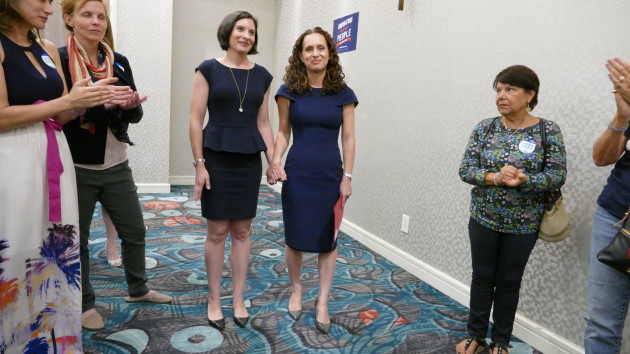
BAER, A PROGRESSIVE, lesbian candidate who ran for Congress in Florida’s 18th District, lost to Republican Brian Mast. Michael Pincus, a 15-year-old volunteer who joined Baer’s campaign after seeing her speak at a March for Our Lives event, wrote about the sadness of election night in Teen Vogue. “[Baer’s] campaign watch party concluded with her hugging each of us and giving out personal thankyous for our hard work. She reminded us that the fight is not over, but I felt crushed, heartbroken, and hopeless.” Still, Pincus wrote that young readers should “bother the hell out of politicians who still don’t stand up for what we, the youth, believe.”
Though Baer’s race was a loss for Democrats in a disappointing night for the state party, Florida’s passage of Amendment 4 will restore voting rights in the state to over a million people with felony chargers, the majority of whom are black men.
LENA EPSTEIN, MI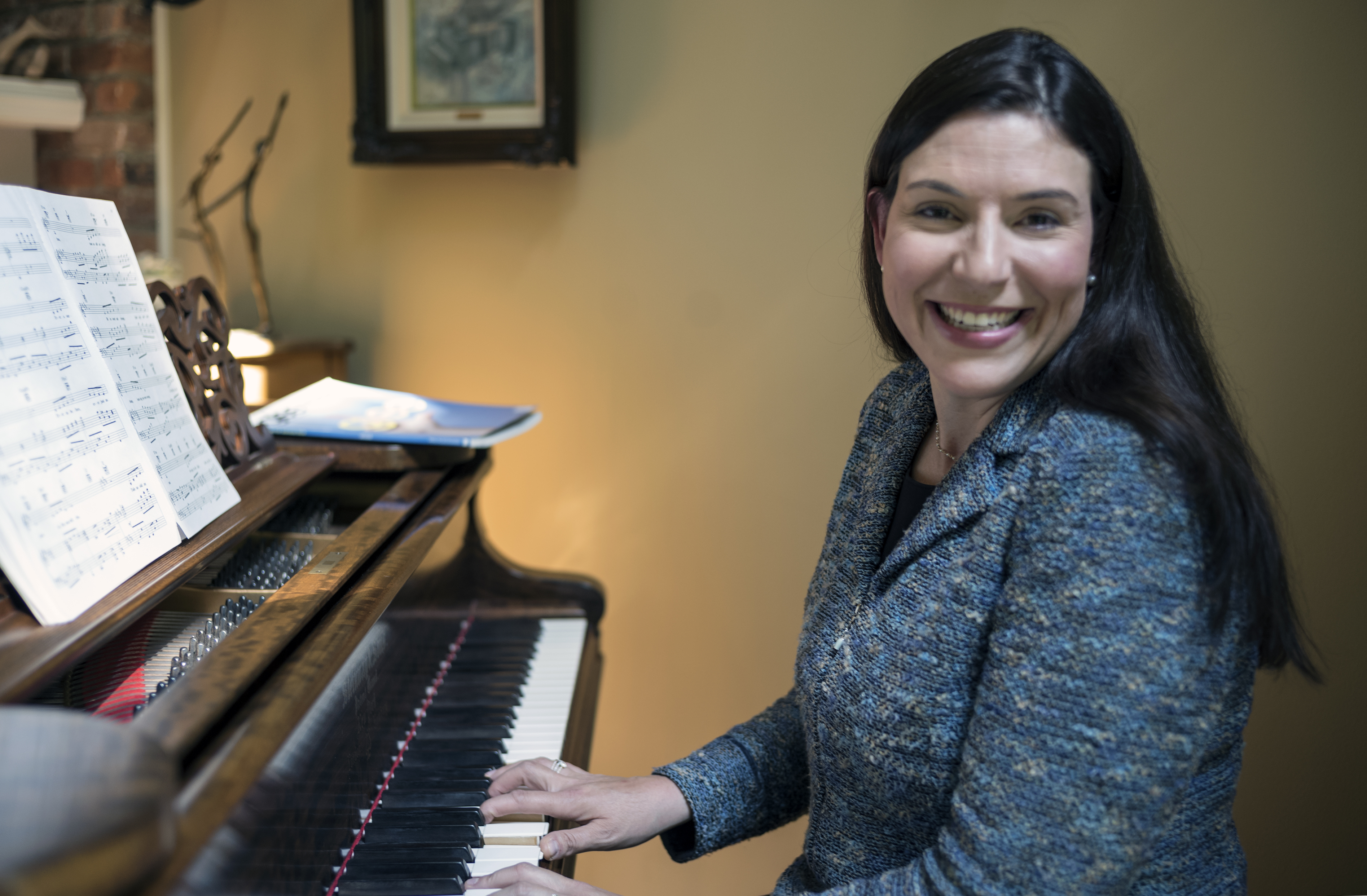
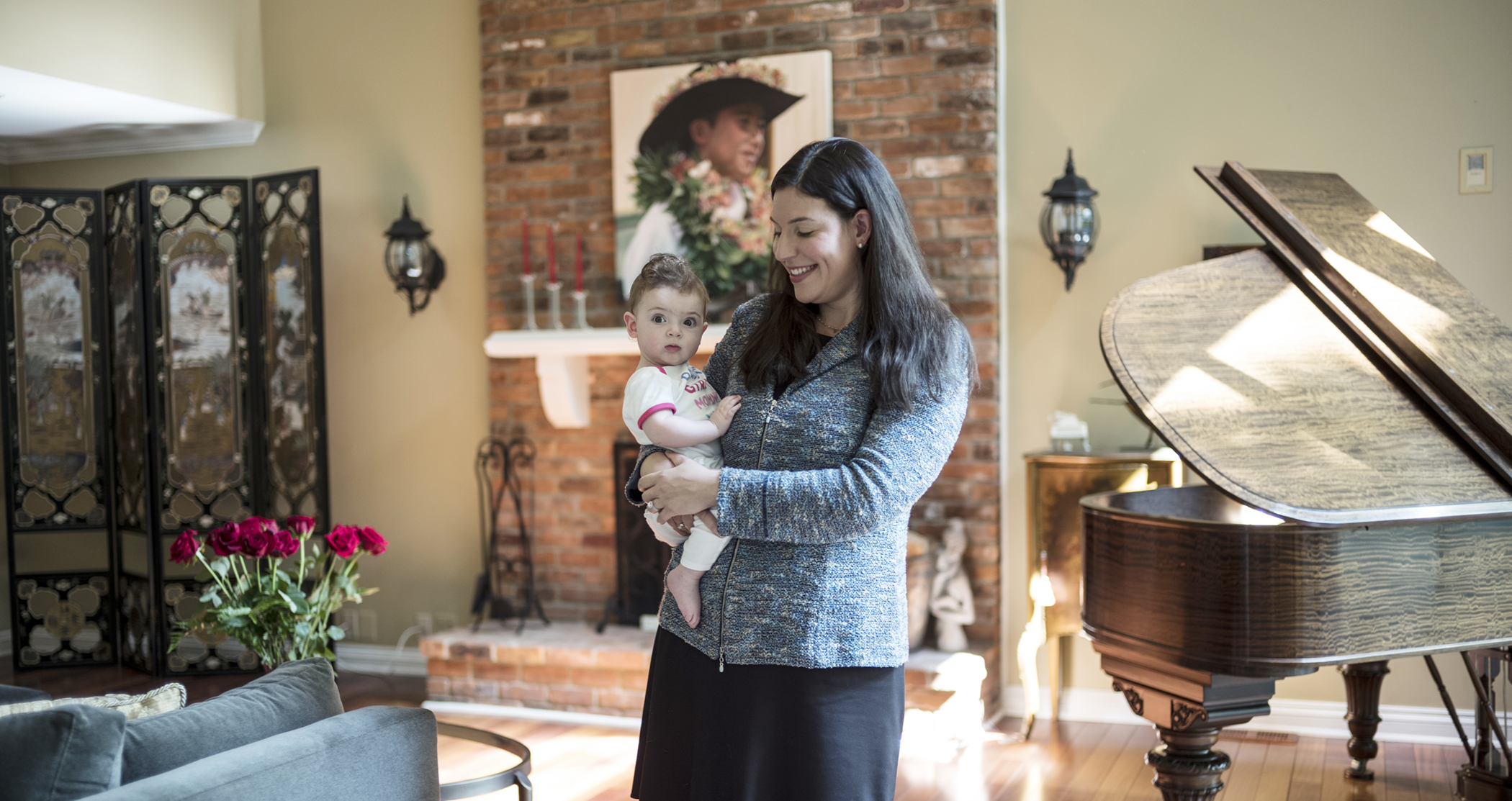
EPSTEIN, A REPUBLICAN running for Congress in Michigan’s 11th district, told Lilith in an interview during the summer of 2018 that she and Ivanka Trump had a lot in common: “We’re both wives and mothers and we love the Jewish community, we both love Donald Trump.”
Epstein’s race, which she lost to Democrat Haley Stevens, attracted national scrutiny in the home stretch, when a rally appearance with Mike Pence after the Tree of Life massacre included a socalled “Messianic Rabbi” who had been defrocked. He began a prayer for the Jewish community of Pittsburgh by blessing the biblical forefathers, and Jesus. Epstein’s embrace of Trumpism, in addition to the rally, upset Jews across the U.S., including a group from her hometown who ran an open letter in a Detroit paper telling Jewish voters to support “any other candidate.”
In a statement released over Twitter, Epstein, who is the first Republican in her family, defended the choice, stating, “I invited the prayer because we must unite as a nation—while embracing our religious differences—in the aftermath of Pennsylvania.”
BEVERLY GOLDSTEIN, OH
REPUBLICAN BEVERLY Goldstein lost Ohio’s 11th congressional district election to incumbent Democrat Marcia Fudge, receiving only 18% of the vote.
On the issues and tone, race was in essence a rerun of the 2016 election with different votes, in which Fudge defeated Goldstein with over 80% of the vote. Goldstein, whose Twitter bio lists her identities as a Trump supporter, daughter of a Holocaust survivor, and Navy wife, tweeted that “I’d have been a great congresswoman.”
Cleveland-based Goldstein, whose post-election plans not to run again were shared with Lilith via her husband and campaign manager, Michael, made adult literacy one of the hallmark planks on her platform. This time around. Donald Trump was not as visible in his support for her as he had been in her previous campaign. Beverly explains, her husband says, that though the president did support women’s races in Ohio, it was only those women who were movers and shakers and destined to win; he did not go overboard on her behalf because she was running in a heavily Democratic district, which the Republican party had long written off.
SHIRA GOODMAN, PA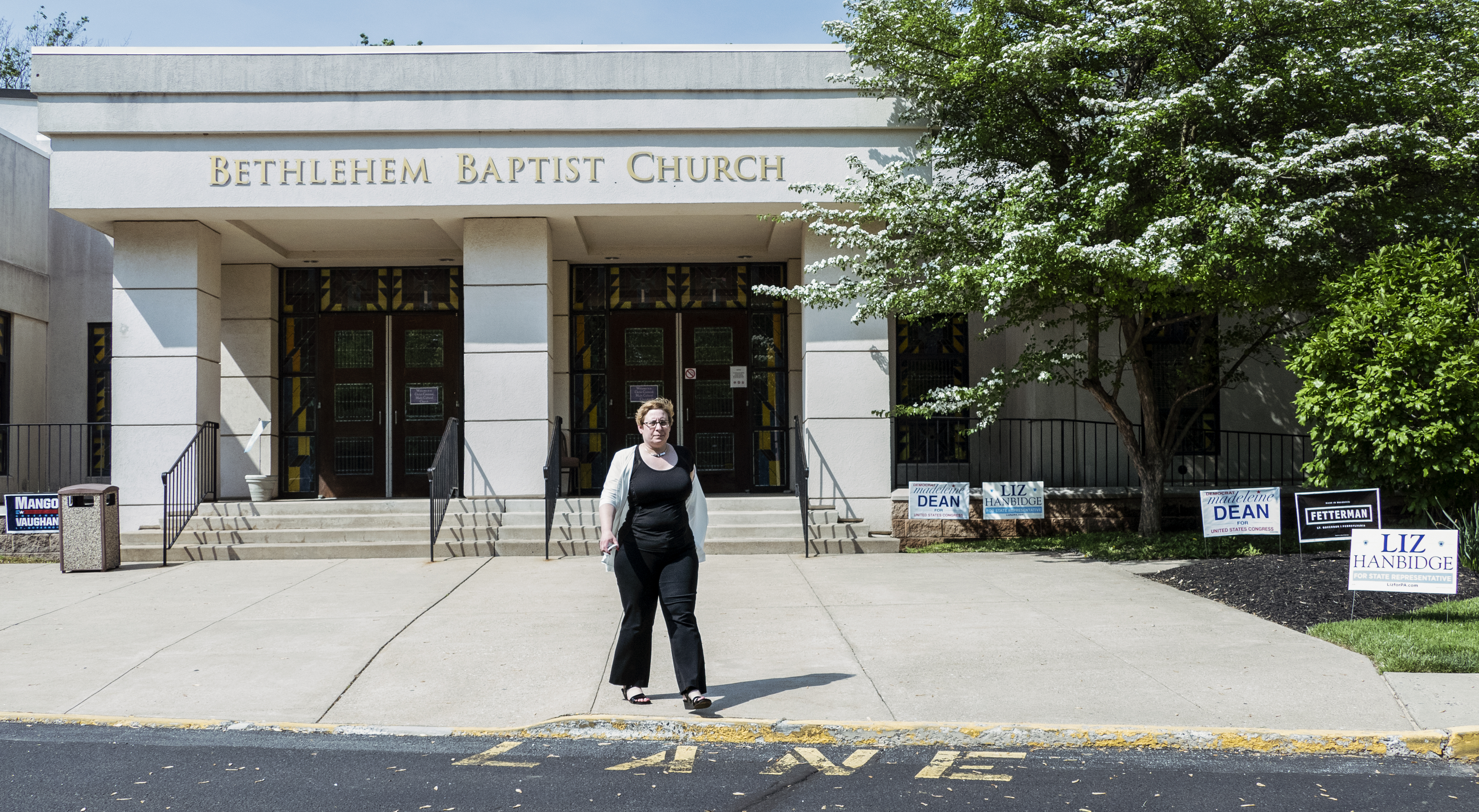
“I THINK IT’S A tough process,” says Goodman, a gun-control advocate who lost her congressional primary in Pennsylvania. “Depending where you run, you have to raise a lot of money, and that’s hard. And some of the political maneuvering can be disheartening. I’m sure other women like me heard ‘You have to pay your dues, you have to run for something else first’.”
Goodman lost her primary—to Madeleine Dean, who then won the congressional seat—and decided that her work was best done where she had started: as an activist against gun violence. Still, she’s glad she ran. “My career was in public service, and I felt qualified for the job I ran for, not for someone else’s idea of what that job was.” And there were some unexpected upsides: “It made me a better fundraiser for the work I’m doing now.”
Within days of the election, Goodman was back at work at her desk as the executive director of CeaseFirePA, a gun-control group. “The election was Tuesday, Friday there was a shooting,” she says.
Sadly, shootings in her state, including the murders at Pittsburgh’s Tree of Life Synagogue, have meant that she’s been busy organizing a grieving community and teaching them about the scourge of gun violence in so many people’s lives every day. “I ran [for office] to see if that was a way to fight for the issues I care about, and it wasn’t meant to be, but I’m still fighting,” she says.
SARA JACOBS, CA
JACOBS, 29, WAS one of the youngest candidates to seek a congressional seat in 2018, and this garnered her attention. Throughout her campaign Jacobs was celebrated in women’s magazines and blogs as a hip choice, a former Hillary Clinton foreign policy advisor fluent in Millennial lingo. The New Yorker wrote, “Her platform is cast toward younger voters; she supports net neutrality, pardons for nonviolent marijuana offenses, and universal Medicare. She wants to cap childcare costs at ten per cent of earned income and expand funding for Pell grants to allow for debt-free college. Many of these projects are ambitious and expensive. ‘I think we’re going to win back the House, so we’ll be able to pass quite a lot of legislation,’ she explained.
Jacobs went academic after her primary loss; she is now a Scholar in Residence at the Joan B. Kroc Institute of Peace and Justice of the University of San Diego, with a focus on 21st century governance and institutional reform challenges. In her concession speech, Jacobs emphasized the success of her competitive primary campaign in getting Democratic excitement to ramp up, leading her district to have “the largest turnout in any congressional race in all of Southern California.”
NAOMI LEVIN, NY
THOUGH REPUBLICAN Naomi Levin lost her congressional race to Jerrold Nadler in New York City—incumbent Nadler received 81.1% of the vote, much of it coming from Brooklyn’s Jewish Borough Park neighborhood—“I am so incredibly proud of what we were able to accomplish,” she wrote in an email to supporters. “I came to a gun fight armed only with a pocket knife, but we got almost HALF of the Brooklyn vote nonetheless (45%). And we won Borough Park in a landslide with 73%.”
It seems Levin’s post-election life hasn’t been too rough: in her concession post on Facebook, Levin mentioned gratitude for her “great career as a software engineer,” and in under two weeks from the election, she says she got engaged. “I never thought I’d run for public office. I agreed to take on this race because I love my country and I care about the people in my district,” she said.
Levin, the Millennial daughter of Jewish immigrants from the Former Soviet Union, has said she believes many of Trump’s policies and actions are “very positive and very beneficial” to America.
ELLEN LIPTON, MI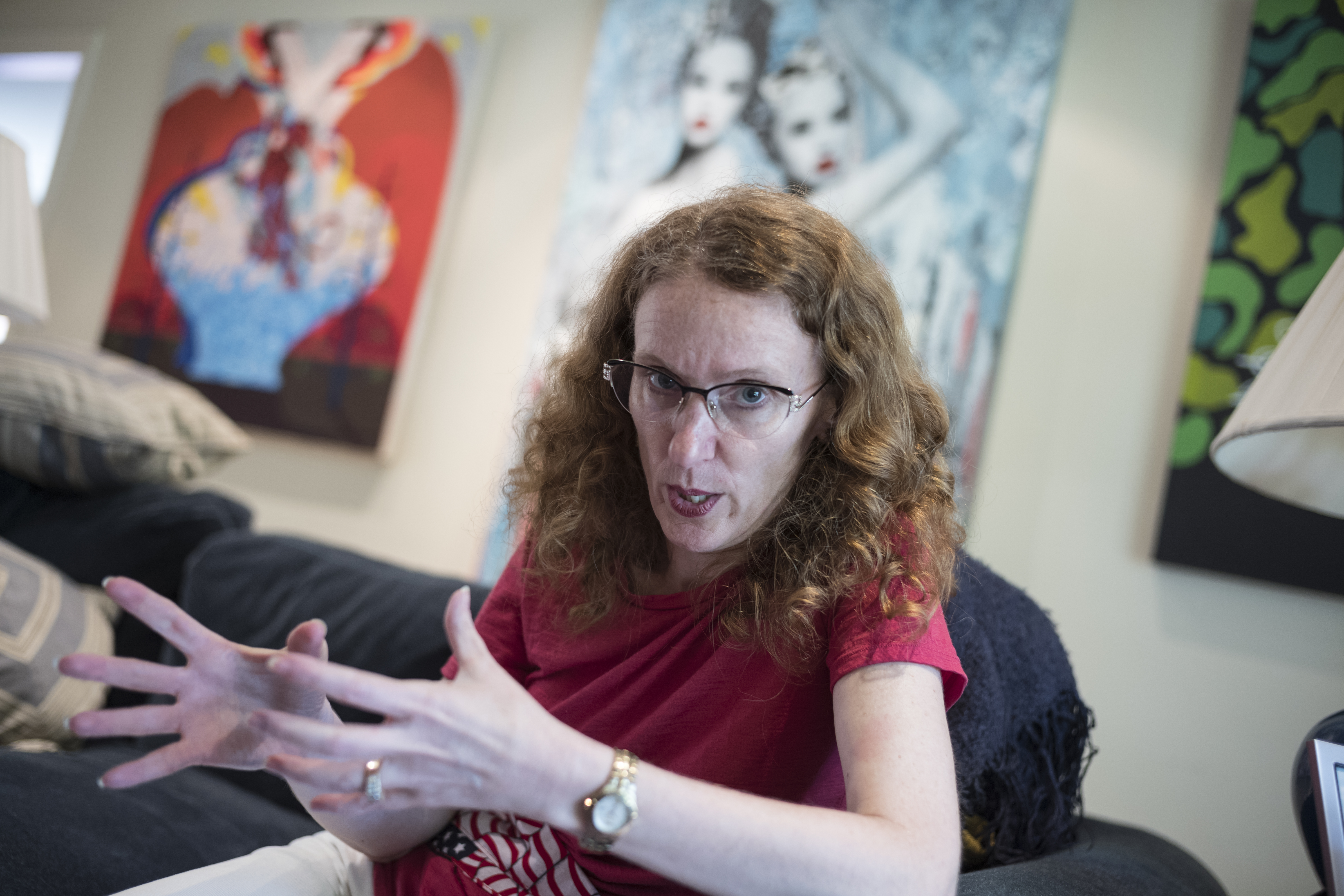
AS A PRIMARY challenger in Michigan, Lipton’s chance of winning her house race was “pretty damn difficult,” she says now. She was facing Democrat Andy Levin (son of 40-year incumbent Carl Levin), who emerged victorious in the summer primaries. His name recognition made her path to victory tough even before she started, but she felt proud that, still, “a woman running always changes the tenor of each and every race,” bringing issues like equity in education funding, which was a signature issue during her time in the State legislature. “To me it was important we talk about education, healthcare,” she said. “Women keep bringing the issues to the table when they run.”
After the primary, Lipton stayed involved, working on the campaigns of other prominent women, including Gretchen Whitmer, who won her race for governor of Michigan. Now Lipton plans to stay politically involved, working first on the transition team for Whitmer drafting education policy. She told Lilith that when people offer condolences on her own race she responds, “I decided to run for office for the possibility, not just the win.” She notes that running is a public service, not a means towards ego gratification. “I advise women: don’t run to find fulfillment,” she said. “Sometimes, a candidate runs just to put her toe in the water. She might not win, but think of how many women she is inspiring.”
Statistics show that women need to be asked three times to run before they consider it, so Lipton jokes that on the campaign trail for herself and others, when she met women who seemed motivated, she would say “consider this your first ask.” “Every woman has it in them to be a change agent,” Lipton says.
KATHY MANNING, NC

IN NORTH CAROLINA’S 13th District, Democrat Kathy Manning (a former Jewish Federations of North America chair) lost to incumbent Representative Ted Budd, in what was considered the most competitive congressional race in the state, and possibly one of the most competitive in the country; Trump made two visits to Charlotte, during which he rallied crowds for Budd. It was a crushing loss, but when it was announced Manning told her supporters, “We must keep in mind that our effort took this gerrymandered district from a likely Republican win to a toss-up in a matter of months…. People who have never been politically active before got deeply involved.”
Offering her own wisdom about moving forward after a defeat, Manning’s daughter, Jenny Kaplan, wrote in an impassioned piece published in Glamour, “At the first signs of a loss [on election night], I felt both wired and deeply saddened. Enter Kathy Manning. She arrived at the watch party without any sign of tears. She embraced person after person with love and gratitude for the hard work…. She asked about other women…running throughout the country, and she was happy to hear so many of her peers won.” Kaplan concluded by saying that her mother’s effect on her generation mattered: “The way she acted when faced with defeat stoked a full-on fire of activism— not just within me, but within people across the North Carolina’s Thirteenth District and across the country.”
LIZ WATSON, IN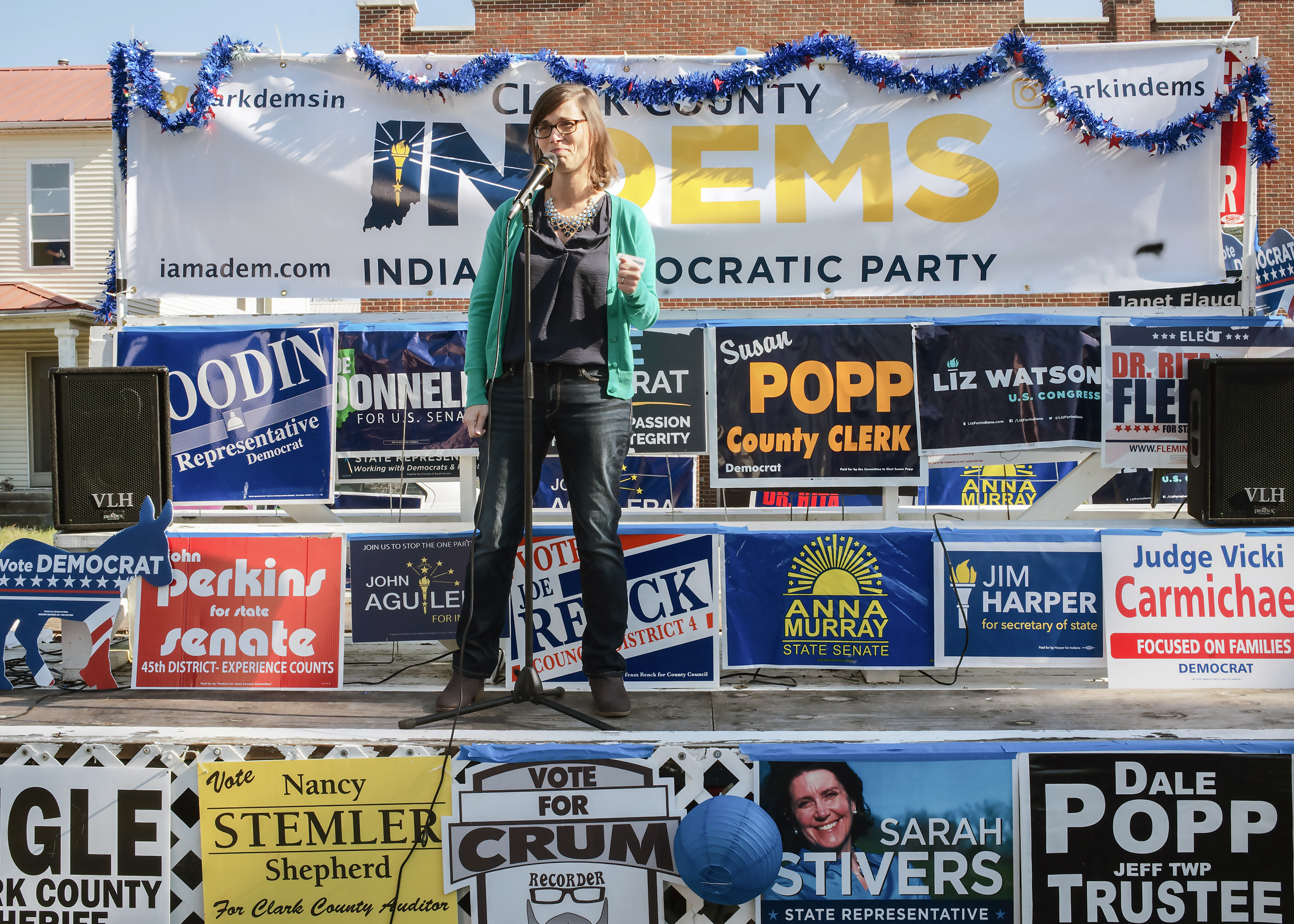
IN AN INDIANA district that went for Trump in 2016, Democrat Liz Watson ambitiously ran for a congressional seat against Rep. Trey Hollingsworth; he won with 59.4% of the vote. In her Facebook concession post, Watson wrote, “we have too many leaders who are doing everything they can to divide us and make us fear each other…. We see opportunistic politicians who demonize immigrants, women, people with disabilities, people of different religions, people of color and our LGBTQ friends, family and neighbors, so that people vote based on fear instead of love.” Watson encouraged her supporters to continue to engage with politics, work on future campaigns, and even run for office themselves.
Additional reporting by Noa Kattler Kupetz and Elana Rebitzer
All photographs by Joan Roth
- 1 Comment
December 17, 2018 by admin
How High School English Class Turned Me Into a Feminist
This article was originally published on Jewish Women, Amplified, the blog of the Jewish Women’s Archive, and was written as part of the Rising Voices Fellowship.
The transition from eighth grade to freshman year is a rough one. Especially if you’re going from a small Jewish school to a large public school and especially if most of your friends are going to other schools and especially if you have the notoriously difficult English teacher™ (yes, you know the one).
Going into English class, I was scared out of my mind. I had no idea how to handle the level of work (both in terms of quality and quantity), and my teacher’s infamous reputation didn’t help calm my nerves in the slightest. My goal at the beginning of the year in English was to do my best, complete the work, and hopefully get good grades.
- No Comments
 Please wait...
Please wait...